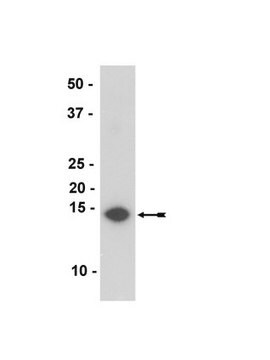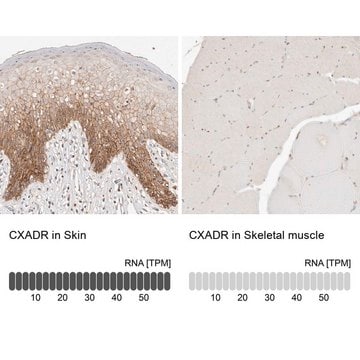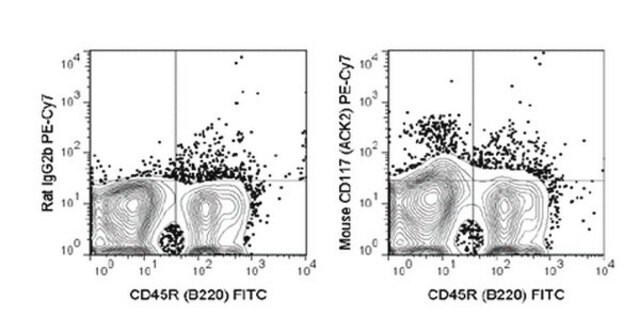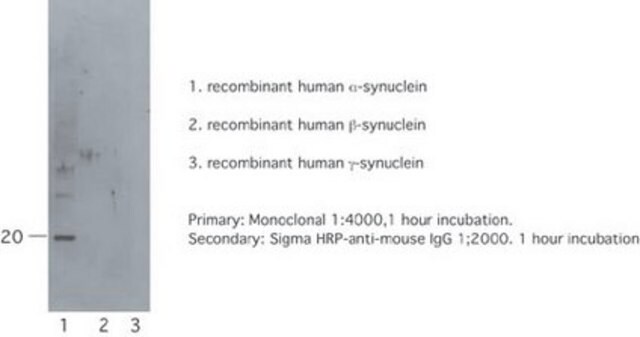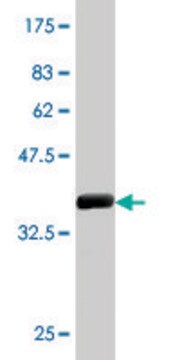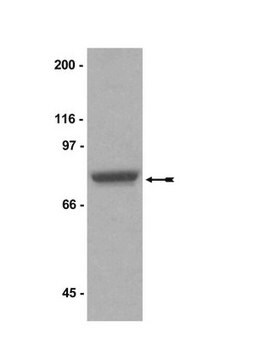MABN1818
Anti-α-Synuclein Antibody, clone SOY1
clone SOY1, from mouse
Synonyme(s) :
Alpha-synuclein, NACP, Non-A beta component of AD amyloid, Non-A4 component of amyloid precursor, Synuclein alpha-140
About This Item
Produits recommandés
Source biologique
mouse
Niveau de qualité
Forme d'anticorps
purified immunoglobulin
Type de produit anticorps
primary antibodies
Clone
SOY1, monoclonal
Espèces réactives
mouse, human
Réactivité de l'espèce (prédite par homologie)
rat (based on 100% sequence homology)
Technique(s)
ELISA: suitable
immunohistochemistry: suitable (paraffin)
immunoprecipitation (IP): suitable
western blot: suitable
Isotype
IgG2bκ
Numéro d'accès NCBI
Numéro d'accès UniProt
Conditions d'expédition
ambient
Modification post-traductionnelle de la cible
unmodified
Informations sur le gène
human ... SNCA(6622)
Description générale
Spécificité
Immunogène
Application
ELISA Analysis: A 1:74.6 dilution from a representative lot (preconjugated with Sulfo tag) detected recombinant human α-synuclein (0.2-40 ng/mL) captured by clone 2F12 (Cat. No. MABN1817; 200 ng/30 µL/well for coating) in a sandwich ELISA application (Courtesy of Tim Bartels, Ph.D., Brigham and Women′s Hospital, Boston, MA, U.S.A.).
Immunoprecipitation Analysis: 4 µL from a representative lot immunoprecipitated α-synuclein from 50 µg of HEL human erythroleukemia cell lysate (Courtesy of Tim Bartels, Ph.D., Brigham and Women′s Hospital, Boston, MA, U.S.A.).
ELISA Analysis: A representative lot (preconjugated with Sulfo tag) detected both endogenous alpha-synuclein (αS) from human cortical homogenate, as well the exogenously expressed wild type and familial PD (fPD) αS mutants (A30P, E46K, H50Q, G51D, A53T) from sytosolic extracts of transfected M17D human neuroblastoma cells in a sandwich ELISA application utilizing clone 2F12 (Cat. No. MABN1817) as the capture antibody (Dettmer, U., et al. (2015). Nat. Commun. 6:7314).
ELISA Analysis: A representative lot (preconjugated with Sulfo tag) detected both pre-aggregated fibrillar recombinant -synuclein as well as partially purified Lewy bodies (LBs) from a DLB (dementia with LBs) patient with or without prior sample denaturing by boiling with 2% SDS in a sandwich ELISA application utilizing clone 2F12 (Cat. No. MABN1817) as the capture antibody (Dettmer, U., et al. (2015). Nat. Commun. 6:7314).
Qualité
Western Blotting Analysis: A 1:125 dilution of this antibody detected α-synuclein in 10 µg of human fetal brain tissue lysate.
Description de la cible
Forme physique
Autres remarques
Vous ne trouvez pas le bon produit ?
Essayez notre Outil de sélection de produits.
En option
Code de la classe de stockage
12 - Non Combustible Liquids
Classe de danger pour l'eau (WGK)
WGK 1
Point d'éclair (°F)
Not applicable
Point d'éclair (°C)
Not applicable
Certificats d'analyse (COA)
Recherchez un Certificats d'analyse (COA) en saisissant le numéro de lot du produit. Les numéros de lot figurent sur l'étiquette du produit après les mots "Lot" ou "Batch".
Déjà en possession de ce produit ?
Retrouvez la documentation relative aux produits que vous avez récemment achetés dans la Bibliothèque de documents.
Notre équipe de scientifiques dispose d'une expérience dans tous les secteurs de la recherche, notamment en sciences de la vie, science des matériaux, synthèse chimique, chromatographie, analyse et dans de nombreux autres domaines..
Contacter notre Service technique